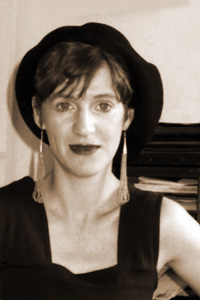

I’m working on a new book of poems and have found that I’m writing with greater attention to a narrative arc, something I’ve learned to do while writing Daughters. These days, though, with a teenager, I’m more pressed for time and write shorter, more lyrical prose. It’s tougher to drop and then re-enter analytical prose–to sustain voice, narrative, train of thought.

I’m certainly not the first to recognize that poetry is certainly more “portable” than prose: you can carry images and lines with you during the day and, with a bit of luck, revise as you go.

Different forms for different moods and meanings. When I was working on my second book, Assignation at Vanishing Point, I was working back and forth between a highly condensed epistolary poetry and a much more discursive line of thought in prose. The current popularity of memoir, I feel, is less about a writer’s desire to “tell all” or the reader’s desire to “know all” than it is about discovery and engagement: tracking the journey toward a changed consciousness. Blur!), popular culture (football, stone circles!), along with literary detours on the Brontes, Sylvia Plath, as well as the late Angela Carter (for whom I served as babysitter in my Iowa grad school days). Along the way, I lingered a bit in guilty pleasures, hoping to offer readers a lighter glimpse of mid-’90’s Britain with an eye toward its music (the skiffle rock of my mother’s youth, Oasis vs. I’ve looked to find intersections between my own family history and that of the larger culture and to tell the truth of my experience.

The essays, of course, differed in length and form, but were linked by a unifying ambition to make sense of the cultural forces that shape women’s identities and lives. So the book grew organically out of conversations I had, out of interests and subjects I wanted to think through. To my delight, people enjoyed reading them and wanted to publish them. I also found prose to be a welcome break from the lyric intensity and narrative compression of poetry.


 0 kommentar(er)
0 kommentar(er)
